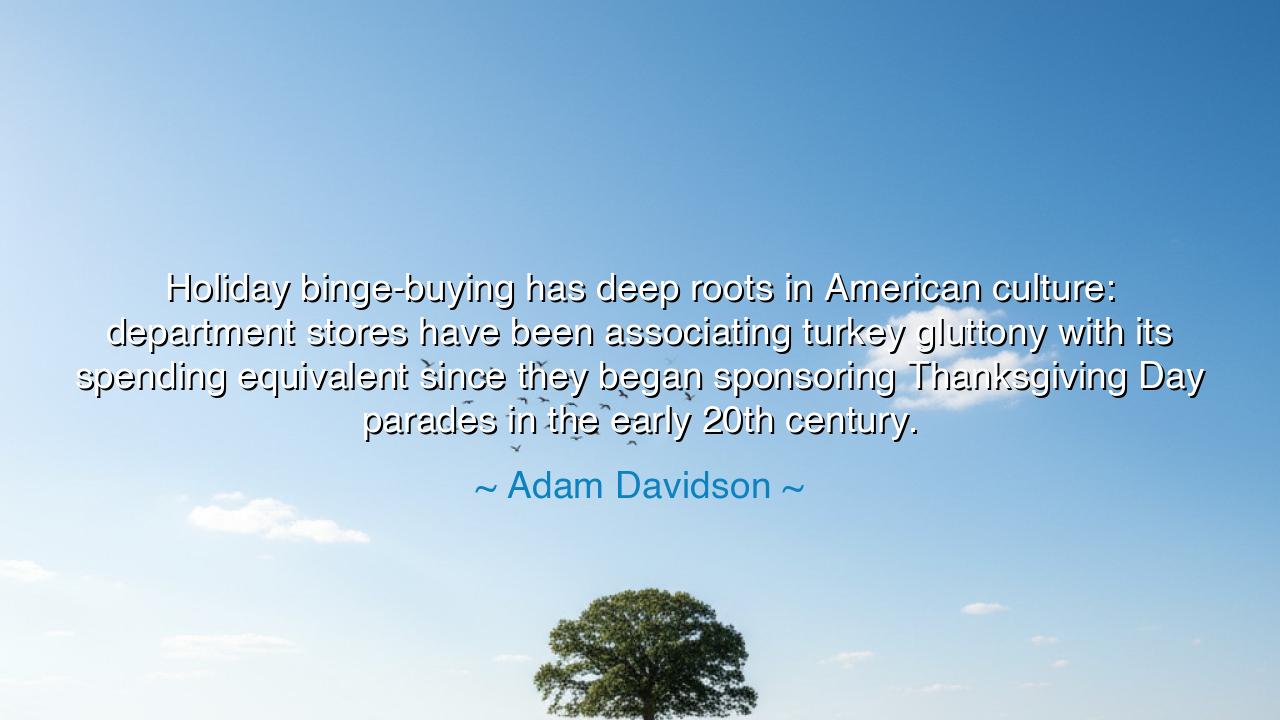
Holiday binge-buying has deep roots in American culture:
Holiday binge-buying has deep roots in American culture: department stores have been associating turkey gluttony with its spending equivalent since they began sponsoring Thanksgiving Day parades in the early 20th century.






In the sharp and knowing words of Adam Davidson, we are reminded of the curious marriage between festivity and commerce: “Holiday binge-buying has deep roots in American culture: department stores have been associating turkey gluttony with its spending equivalent since they began sponsoring Thanksgiving Day parades in the early 20th century.” What at first seems a witty remark is, in truth, a revelation of how joy, gratitude, and excess have become intertwined, shaping not only the way people feast, but also the way they spend. It is a tale of abundance and appetite, of how merchants harnessed the spirit of celebration and transformed it into an engine of consumption.
The meaning of his words begins with the link between gluttony and buying. Just as the body hungers for the feast of turkey and pie, the marketplace tempts the soul with its own feast of goods, urging people to indulge beyond necessity. This pairing was no accident. In the early 20th century, the great department stores—Macy’s, Gimbels, and others—saw in Thanksgiving not only a holiday of gratitude, but an opportunity to extend the spirit of plenty into the world of commerce. By sponsoring parades filled with spectacle, balloons, and Santa Claus himself, they placed shopping side by side with the feast, as though both were equally sacred traditions.
The origin of this alliance is found in the parades, those rivers of color and music that flooded the streets of New York and beyond. These processions were not mere entertainments—they were rituals of advertising, designed to usher the crowd from the banquet table to the store counter. The turkey, roasted in homes across the nation, became symbolic not only of fullness of stomach but of fullness of desire. When the last bite was eaten, families were invited to turn their appetite toward the marketplace, to continue their celebration with purchases, gifts, and the promise of holiday cheer.
History offers many parallels. In ancient Rome, festivals such as Saturnalia were marked by both feasting and excess of spending. Merchants thrived in the chaos of celebration, selling trinkets, luxuries, and indulgences to citizens carried away by the spirit of festivity. The line between gratitude and greed was often thin, just as it remains today. Davidson’s insight reveals that the American version of this ancient cycle was carefully cultivated—merchants turning Thanksgiving into a gateway, not an ending, of indulgence.
Yet there is a duality here. On one hand, the blending of holiday and commerce reflects human joy, the desire to share, to give, and to celebrate with abundance. On the other, it carries the danger of forgetting the heart of Thanksgiving—that it is gratitude, not acquisition, that gives meaning to the season. The parade, though wondrous, also serves as a subtle reminder that in America, even traditions of the hearth are bound to the marketplace.
The lesson for us is this: do not despise abundance, but do not be enslaved by it. Recognize that the joy of Thanksgiving lies not in how much you eat, nor in how much you spend, but in how deeply you give thanks and how generously you share with others. The parades and the purchases may enrich the senses, but only gratitude enriches the soul. Without this balance, the feast of the turkey becomes only gluttony, and the joy of giving becomes only consumption.
Practical wisdom follows. When the parades march and the sales beckon, pause to remember why the season exists. Buy, if you must, but do not let buying become the heart of your celebration. Share your abundance with those who have little. Teach your children that the true richness of the holiday is not in the parade floats or the department store windows, but in the faces gathered around the table.
Thus, in the observation of Adam Davidson, we glimpse the entanglement of gratitude and greed, of feasting and shopping. Let us honor the wisdom hidden in his words: that while merchants may turn Thanksgiving into a gateway to binge-buying, it is in our hands to preserve its deeper meaning. For when gratitude leads the way, the holiday becomes not a season of gluttony, but a season of grace.






AAdministratorAdministrator
Welcome, honored guests. Please leave a comment, we will respond soon